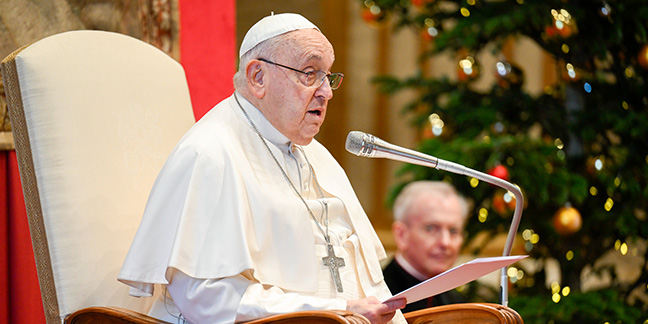 Pope Francis talks briefly to ambassadors and diplomats accredited to the Holy See during their annual meeting in the Hall of Blessing in the Apostolic Palace at the Vatican Jan. 9, 2025. Because of a cold, the pope had an aide read most of his speech. (CNS photo/Vatican Media)VATICAN CITY — Rather than supporting the growth of commercial technology and artificial intelligence, governments should be supporting families and educators in being the main channels of passing on culture and values, Pope Francis told ambassadors and other diplomats accredited to the Holy See.
Pope Francis talks briefly to ambassadors and diplomats accredited to the Holy See during their annual meeting in the Hall of Blessing in the Apostolic Palace at the Vatican Jan. 9, 2025. Because of a cold, the pope had an aide read most of his speech. (CNS photo/Vatican Media)VATICAN CITY — Rather than supporting the growth of commercial technology and artificial intelligence, governments should be supporting families and educators in being the main channels of passing on culture and values, Pope Francis told ambassadors and other diplomats accredited to the Holy See.
"Here we see the importance of media literacy education, which aims to provide the essential tools needed to promote critical thinking skills, to equip young people with the necessary means for their personal growth and their active participation in the future of their societies," he said in a written speech delivered Jan. 9.
Because of a lingering cold, the pope had most of his speech read by an aide, Msgr. Filippo Ciampanelli, at the meeting with representatives of 184 nations, the European Union and the Sovereign Military Order of Malta.
While the bulk of his text was dedicated to political concerns and diplomatic efforts, a portion was devoted to the importance of communication, truth, information technology and a common language "anchored in the reality of things" for people to be able to dialogue, understand one another and resolve conflicts.
Pope Francis criticized the attempt "to manipulate multilateral documents -- by changing the meaning of terms or unilaterally reinterpreting the content of human rights treaties -- in order to advance divisive ideologies that trample on the values and beliefs of peoples."
"It represents a form of genuine ideological colonization that attempts, in accordance with carefully planned agendas, to uproot the traditions, history and religious bonds of peoples," he wrote, saying such efforts claim to leave behind "the dark pages of history" but instead open "the door to the 'cancel culture.'"
"It tolerates no differences and focuses on individual rights to the detriment of duties toward others, especially the weakest and most vulnerable," he wrote. "It is unacceptable, for example, to speak of an alleged 'right to abortion' that contradicts human rights, particularly the right to life."
Without mentioning specifics, the pope was likely referring to major international and regional declarations and conventions on human rights, which support a woman's right to terminate an unwanted pregnancy and ascribe the protection and right to life only to those who have been born, rejecting claims that human rights apply to the unborn starting from conception.
The pope told diplomats, "All life must be protected, at every moment, from conception to natural death, because no child is a mistake or guilty of existing, just as no elderly or sick person may be deprived of hope and discarded."
Many multilateral institutions require reform, he wrote, because they do not seem able to respond effectively to today's challenges regarding the environment, public health, culture, social issues and artificial intelligence.
"Scientific progress, especially in the area of information and communications technology, has brought undoubted benefits for mankind," he wrote, such as making it easier to carry out daily tasks, stay in touch with loved ones, remain informed and broaden one's knowledge.
"At the same time, its limitations and dangers cannot be overlooked, since it often contributes to polarization, a narrowing of intellectual perspectives, a simplification of reality, misuse, anxiety and, ironically, isolation, particularly as a result of the use of social media and online games," the pope wrote.
"The growth of artificial intelligence," he said, "raises broader concerns about intellectual property rights, the job security of millions of people, the need to respect privacy and to protect the environment from e-waste," that is, electrical and electronic devices, appliances and equipment that sometimes contain harmful chemical substances and neurotoxicants like lead.
Rapid advances in technology have led to a "broad cultural transformation" worldwide, he said. However, this technology, which is strongly aligned with commercial interests, is "generating a culture rooted in consumerism."
"This imbalance threatens to subvert the order of values inherent in the creation of relationships, education and the transmission of social mores, whereas parents, close relatives and educators must remain the main channels for the transmission of culture, for the sake of which governments should limit themselves to providing support for them in their educational responsibilities," especially in promoting media literacy, he wrote.
— Carol Glatz, Catholic News Service


